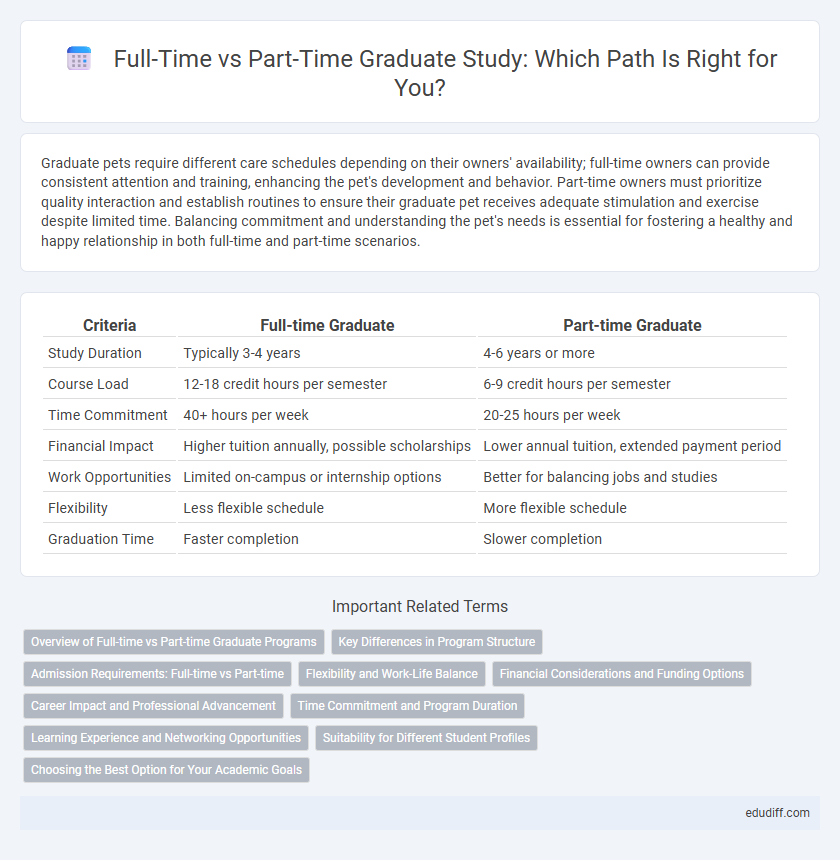Graduate pets require different care schedules depending on their owners' availability; full-time owners can provide consistent attention and training, enhancing the pet's development and behavior. Part-time owners must prioritize quality interaction and establish routines to ensure their graduate pet receives adequate stimulation and exercise despite limited time. Balancing commitment and understanding the pet's needs is essential for fostering a healthy and happy relationship in both full-time and part-time scenarios.
Table of Comparison
| Criteria | Full-time Graduate | Part-time Graduate |
|---|---|---|
| Study Duration | Typically 3-4 years | 4-6 years or more |
| Course Load | 12-18 credit hours per semester | 6-9 credit hours per semester |
| Time Commitment | 40+ hours per week | 20-25 hours per week |
| Financial Impact | Higher tuition annually, possible scholarships | Lower annual tuition, extended payment period |
| Work Opportunities | Limited on-campus or internship options | Better for balancing jobs and studies |
| Flexibility | Less flexible schedule | More flexible schedule |
| Graduation Time | Faster completion | Slower completion |
Overview of Full-time vs Part-time Graduate Programs
Full-time graduate programs typically require a commitment of 9 to 12 credit hours per semester, enabling students to complete their degrees faster, often within two years. Part-time programs allow flexible course loads, ideal for working professionals balancing education with employment, but usually extend the completion time to three or more years. Enrollment status affects tuition fees, financial aid eligibility, and access to campus resources, making it crucial to align program choice with individual academic and career goals.
Key Differences in Program Structure
Full-time graduate programs typically require students to complete 9 to 12 credit hours per semester, allowing them to finish their degrees faster, often within 1 to 2 years. Part-time programs usually involve taking 3 to 6 credit hours each semester, extending the duration to 3 or more years but offering greater flexibility for working professionals. The program structure in full-time studies emphasizes intensive coursework and research, whereas part-time formats balance academic commitments with personal and professional responsibilities.
Admission Requirements: Full-time vs Part-time
Full-time graduate program admission requirements typically emphasize a strong academic record, standardized test scores, and full availability for intensive coursework. Part-time graduate programs often offer more flexible admission criteria, accommodating working professionals with relevant experience and allowing for a balance between work and study. Understanding these differences helps applicants choose the program that best matches their career goals and personal commitments.
Flexibility and Work-Life Balance
Full-time graduate programs typically demand a structured schedule, offering less flexibility but a more immersive academic experience. Part-time study provides increased flexibility, allowing students to balance coursework with professional commitments, enhancing work-life balance. Choosing part-time enrollment helps manage time effectively, reducing stress while maintaining career progression.
Financial Considerations and Funding Options
Full-time graduate programs typically require a larger financial commitment upfront, but may offer more comprehensive funding options such as scholarships, assistantships, and stipends. Part-time students can spread tuition costs over a longer period, easing immediate financial pressure, but often have limited access to institutional funding and benefits. Evaluating employer tuition assistance, federal loans, and grant opportunities is crucial when deciding between full-time and part-time enrollment.
Career Impact and Professional Advancement
Full-time graduate programs often lead to faster career advancement by providing immersive learning experiences and extensive networking opportunities with industry professionals. Part-time study allows working graduates to apply new skills immediately, enhancing job performance while maintaining income, but may delay professional promotion timelines. Choosing the right format depends on career goals, balancing immediate work demands with long-term advancement priorities.
Time Commitment and Program Duration
Full-time graduate programs typically require 12-18 credit hours per semester, demanding a significant time commitment of around 40 hours per week, which accelerates program completion to 1-2 years. Part-time graduate studies allow enrollment in 6-9 credit hours per semester, reducing weekly study time to approximately 15-20 hours and extending program duration to 3-5 years. Choosing full-time or part-time options depends on balancing academic intensity with work and personal responsibilities.
Learning Experience and Networking Opportunities
Full-time graduate programs immerse students in an intensive learning environment, fostering deeper engagement with coursework and access to club activities and seminars that enhance practical skills. Part-time studies offer flexibility, allowing students to apply theoretical knowledge directly to their professional roles while maintaining work-life balance, though networking opportunities may be more limited due to fewer on-campus interactions. The choice impacts the breadth of peer connections: full-time students often build diverse networks through daily campus presence, whereas part-time students typically connect within professional circles related to their careers.
Suitability for Different Student Profiles
Full-time study suits recent high school graduates seeking immersive academic experiences and faster degree completion. Part-time programs benefit working professionals or students managing family commitments, allowing flexible scheduling without sacrificing career or personal responsibilities. Choosing between full-time and part-time depends on individual goals, time availability, and financial considerations impacting student success.
Choosing the Best Option for Your Academic Goals
Full-time graduate study typically demands 12 to 18 credit hours per semester, accelerating degree completion and enabling access to financial aid and campus resources. Part-time enrollment allows flexibility for working professionals, often extending program duration but accommodating work-life balance and reducing immediate academic stress. Evaluating personal commitments, career objectives, and financial resources is essential to determining the optimal pathway for academic success.
Full-time vs Part-time Infographic

 edudiff.com
edudiff.com